Data Analytics and Business Intelligence in Healthcare Report
VerifiedAdded on 2022/08/14
|11
|2994
|13
Report
AI Summary
This report examines the crucial role of data analytics and business intelligence in the healthcare industry. It provides an overview of how data analytics is used to analyze large datasets, leading to improved patient care, streamlined operations, and cost reductions. The report details the value of healthcare analytics, including the use of electronic health records and machine learning, and the benefits of data analytics in decision-making. It also explores how data analytics can be deployed in healthcare, including managing donations, scheduling physicians, and improving patient satisfaction. The report highlights the advantages of data analytics for patient care, such as evaluating practitioner performance, predicting risks, and controlling treatment costs. The report concludes by emphasizing the importance of data analytics for healthcare organizations and its potential for future developments.
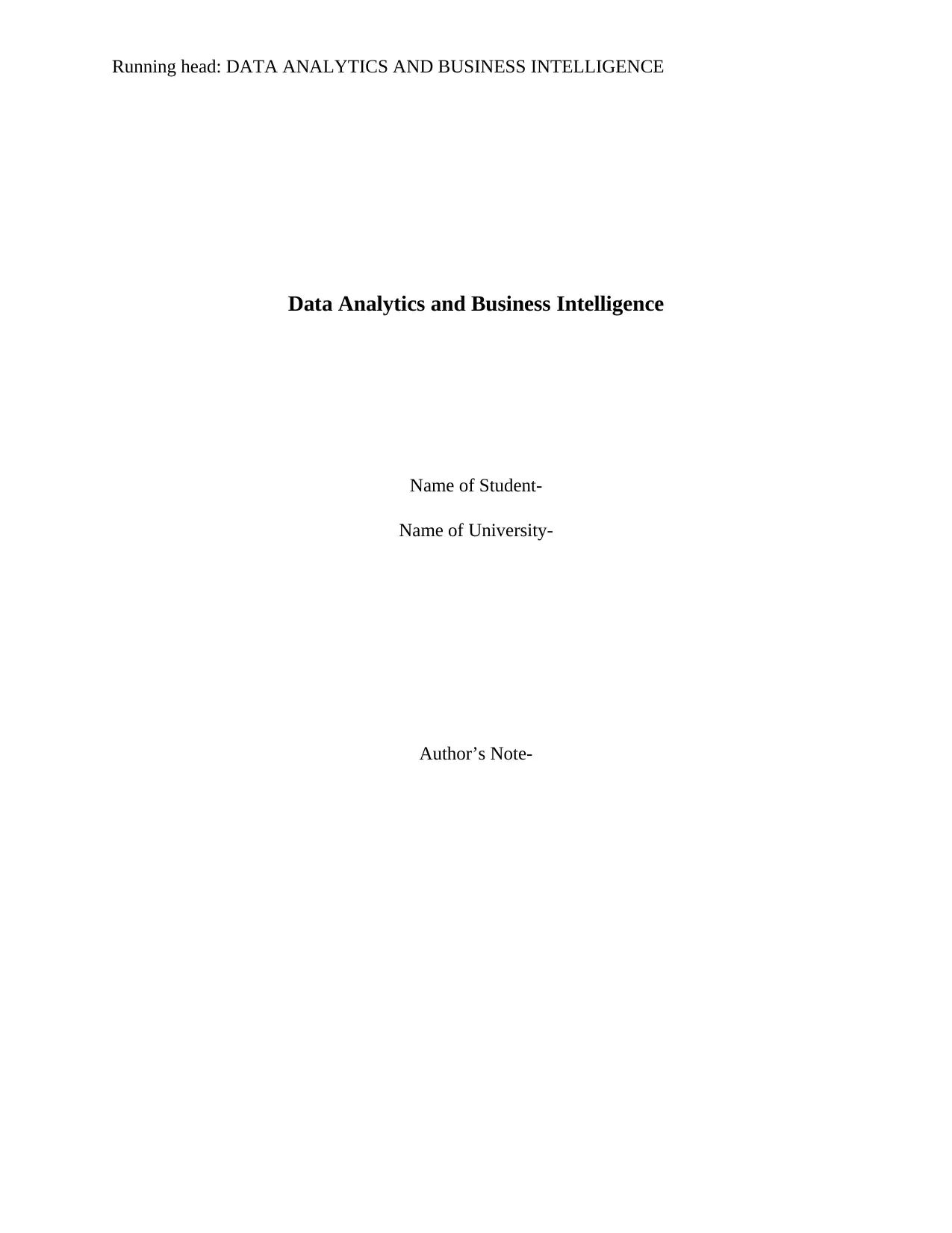
Running head: DATA ANALYTICS AND BUSINESS INTELLIGENCE
Data Analytics and Business Intelligence
Name of Student-
Name of University-
Author’s Note-
Data Analytics and Business Intelligence
Name of Student-
Name of University-
Author’s Note-
Paraphrase This Document
Need a fresh take? Get an instant paraphrase of this document with our AI Paraphraser
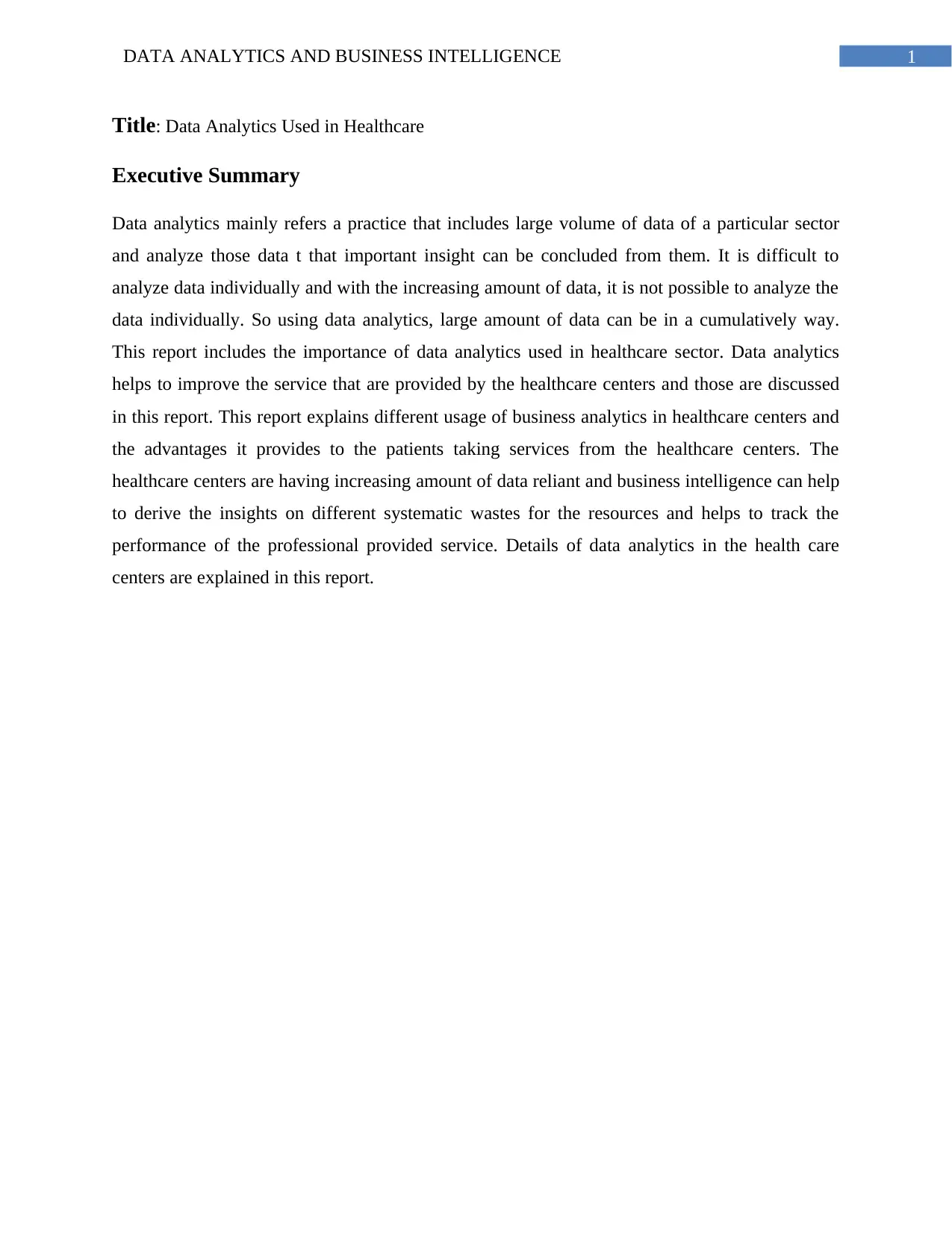
1DATA ANALYTICS AND BUSINESS INTELLIGENCE
Title: Data Analytics Used in Healthcare
Executive Summary
Data analytics mainly refers a practice that includes large volume of data of a particular sector
and analyze those data t that important insight can be concluded from them. It is difficult to
analyze data individually and with the increasing amount of data, it is not possible to analyze the
data individually. So using data analytics, large amount of data can be in a cumulatively way.
This report includes the importance of data analytics used in healthcare sector. Data analytics
helps to improve the service that are provided by the healthcare centers and those are discussed
in this report. This report explains different usage of business analytics in healthcare centers and
the advantages it provides to the patients taking services from the healthcare centers. The
healthcare centers are having increasing amount of data reliant and business intelligence can help
to derive the insights on different systematic wastes for the resources and helps to track the
performance of the professional provided service. Details of data analytics in the health care
centers are explained in this report.
Title: Data Analytics Used in Healthcare
Executive Summary
Data analytics mainly refers a practice that includes large volume of data of a particular sector
and analyze those data t that important insight can be concluded from them. It is difficult to
analyze data individually and with the increasing amount of data, it is not possible to analyze the
data individually. So using data analytics, large amount of data can be in a cumulatively way.
This report includes the importance of data analytics used in healthcare sector. Data analytics
helps to improve the service that are provided by the healthcare centers and those are discussed
in this report. This report explains different usage of business analytics in healthcare centers and
the advantages it provides to the patients taking services from the healthcare centers. The
healthcare centers are having increasing amount of data reliant and business intelligence can help
to derive the insights on different systematic wastes for the resources and helps to track the
performance of the professional provided service. Details of data analytics in the health care
centers are explained in this report.
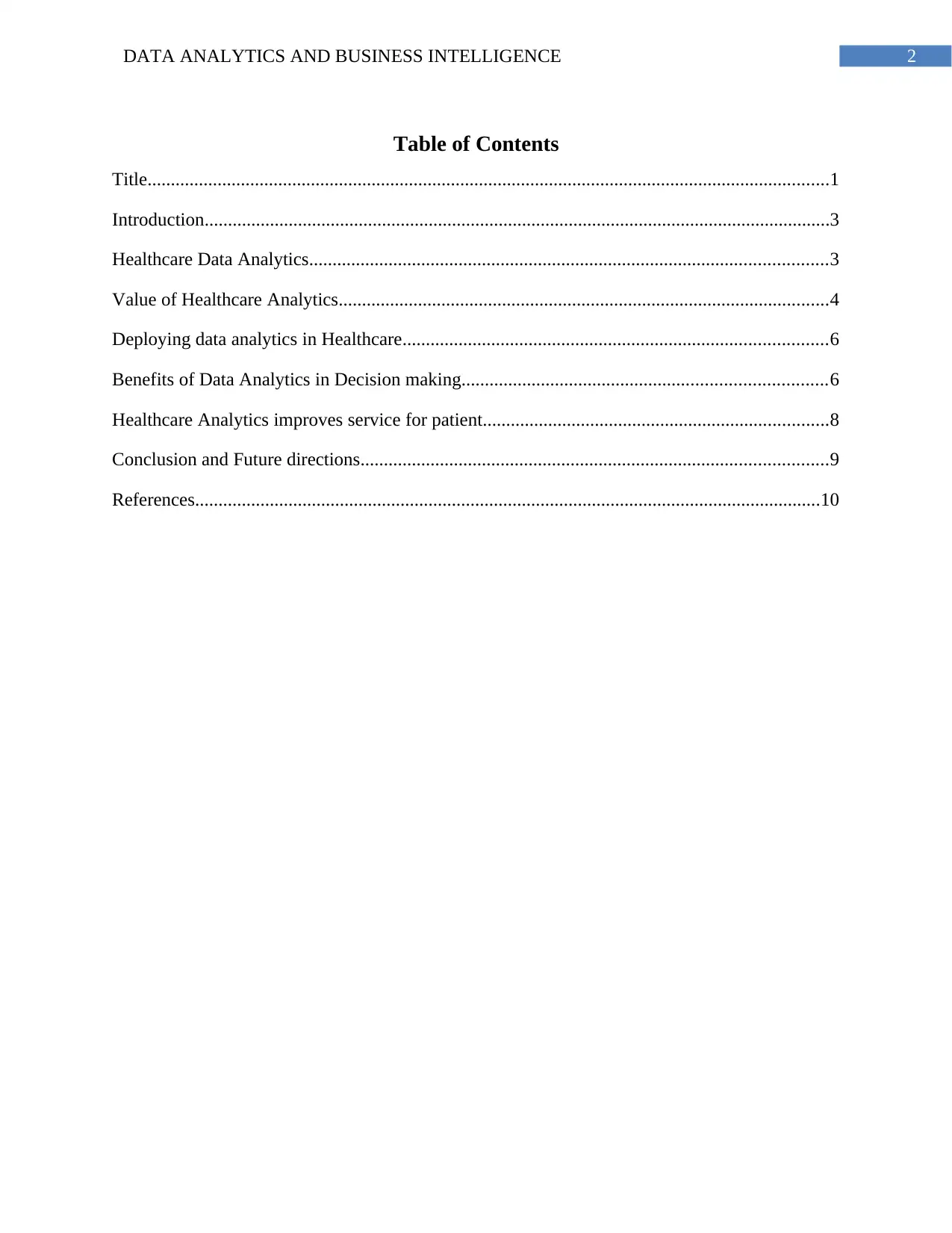
2DATA ANALYTICS AND BUSINESS INTELLIGENCE
Table of Contents
Title..................................................................................................................................................1
Introduction......................................................................................................................................3
Healthcare Data Analytics...............................................................................................................3
Value of Healthcare Analytics.........................................................................................................4
Deploying data analytics in Healthcare...........................................................................................6
Benefits of Data Analytics in Decision making..............................................................................6
Healthcare Analytics improves service for patient..........................................................................8
Conclusion and Future directions....................................................................................................9
References......................................................................................................................................10
Table of Contents
Title..................................................................................................................................................1
Introduction......................................................................................................................................3
Healthcare Data Analytics...............................................................................................................3
Value of Healthcare Analytics.........................................................................................................4
Deploying data analytics in Healthcare...........................................................................................6
Benefits of Data Analytics in Decision making..............................................................................6
Healthcare Analytics improves service for patient..........................................................................8
Conclusion and Future directions....................................................................................................9
References......................................................................................................................................10
⊘ This is a preview!⊘
Do you want full access?
Subscribe today to unlock all pages.

Trusted by 1+ million students worldwide

3DATA ANALYTICS AND BUSINESS INTELLIGENCE
Introduction
Data analytics that is used in organizations is considered as process of examining the data
sets so that conclusion can be taken from the evaluation (Wang, Kung and Byrd 2018). The
techniques and technologies that are used in data analytics are used in commercial industries so
that informed decisions can be made.
This can also be defined as qualitative as well as quantitative technique including the
processes that are used for enhancing business gain and productivity (Manogaran et al. 2017).
Extraction of data as well as categorization of data can be identified and analyzed with
behavioral data and techniques included in data analytics might differ in different cases.
Data analytics is mainly used in B2C business applications. All the global organizations
analyze as well as collect data that are associated with the customers, market economic, practical
experience, and business processes. Data is mainly categorized, analyzed as well as stored for
studying the purchasing trends and the purchasing patterns of the organization.
Data analytics is wide term encompassing different types of data and the analysis of data.
Any particular information can be stated as technique of data analytics for getting the insight for
improving the business. Data analytics mainly refers to assortment of all applications including
basic intelligence, online analytical processing to different forms of analytics. When used in
businesses, data analytics helps in increasing the business revenues, optimize marketing, helps to
increase customer service, and also helps to improve operational efficiency.
Healthcare Data Analytics
Data analytics in healthcare includes collection of data and analyzing the data of
healthcare industry so that it can support the decision making and gain insights. Healthcare
analytics is used in medical costs, clinical data, pharmaceuticals and improve patient behavior.
The micro and the macro levels are to be used to streamline the operations, lowers the overall
costs and helps to streamline the operations in health care sectors (Kankanhalli et al. 2016). The
data that are generated in healthcare are the most complex data. Data included in healthcare data
includes electronic health records for monitoring the vital signs of real time. The data comes
Introduction
Data analytics that is used in organizations is considered as process of examining the data
sets so that conclusion can be taken from the evaluation (Wang, Kung and Byrd 2018). The
techniques and technologies that are used in data analytics are used in commercial industries so
that informed decisions can be made.
This can also be defined as qualitative as well as quantitative technique including the
processes that are used for enhancing business gain and productivity (Manogaran et al. 2017).
Extraction of data as well as categorization of data can be identified and analyzed with
behavioral data and techniques included in data analytics might differ in different cases.
Data analytics is mainly used in B2C business applications. All the global organizations
analyze as well as collect data that are associated with the customers, market economic, practical
experience, and business processes. Data is mainly categorized, analyzed as well as stored for
studying the purchasing trends and the purchasing patterns of the organization.
Data analytics is wide term encompassing different types of data and the analysis of data.
Any particular information can be stated as technique of data analytics for getting the insight for
improving the business. Data analytics mainly refers to assortment of all applications including
basic intelligence, online analytical processing to different forms of analytics. When used in
businesses, data analytics helps in increasing the business revenues, optimize marketing, helps to
increase customer service, and also helps to improve operational efficiency.
Healthcare Data Analytics
Data analytics in healthcare includes collection of data and analyzing the data of
healthcare industry so that it can support the decision making and gain insights. Healthcare
analytics is used in medical costs, clinical data, pharmaceuticals and improve patient behavior.
The micro and the macro levels are to be used to streamline the operations, lowers the overall
costs and helps to streamline the operations in health care sectors (Kankanhalli et al. 2016). The
data that are generated in healthcare are the most complex data. Data included in healthcare data
includes electronic health records for monitoring the vital signs of real time. The data comes
Paraphrase This Document
Need a fresh take? Get an instant paraphrase of this document with our AI Paraphraser
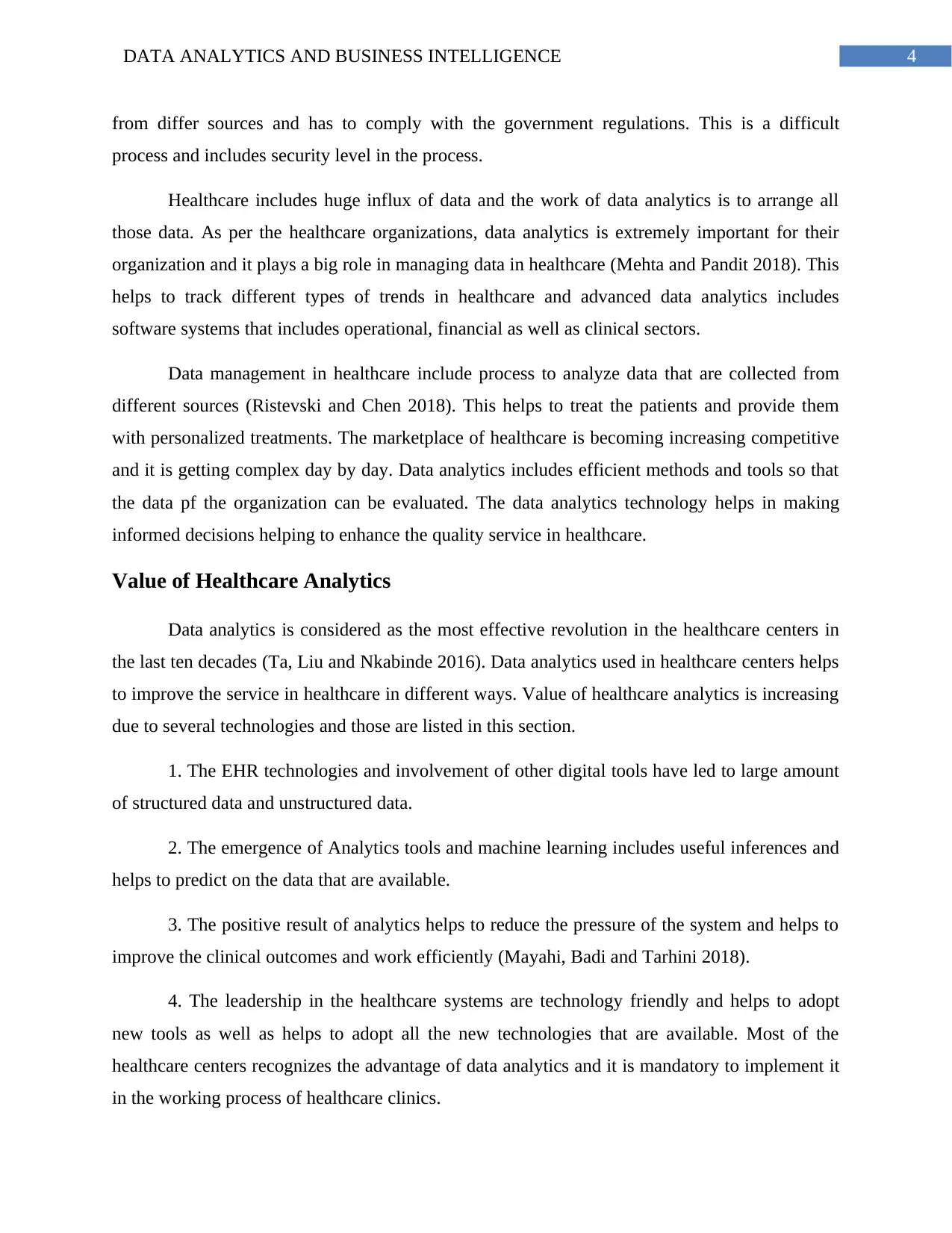
4DATA ANALYTICS AND BUSINESS INTELLIGENCE
from differ sources and has to comply with the government regulations. This is a difficult
process and includes security level in the process.
Healthcare includes huge influx of data and the work of data analytics is to arrange all
those data. As per the healthcare organizations, data analytics is extremely important for their
organization and it plays a big role in managing data in healthcare (Mehta and Pandit 2018). This
helps to track different types of trends in healthcare and advanced data analytics includes
software systems that includes operational, financial as well as clinical sectors.
Data management in healthcare include process to analyze data that are collected from
different sources (Ristevski and Chen 2018). This helps to treat the patients and provide them
with personalized treatments. The marketplace of healthcare is becoming increasing competitive
and it is getting complex day by day. Data analytics includes efficient methods and tools so that
the data pf the organization can be evaluated. The data analytics technology helps in making
informed decisions helping to enhance the quality service in healthcare.
Value of Healthcare Analytics
Data analytics is considered as the most effective revolution in the healthcare centers in
the last ten decades (Ta, Liu and Nkabinde 2016). Data analytics used in healthcare centers helps
to improve the service in healthcare in different ways. Value of healthcare analytics is increasing
due to several technologies and those are listed in this section.
1. The EHR technologies and involvement of other digital tools have led to large amount
of structured data and unstructured data.
2. The emergence of Analytics tools and machine learning includes useful inferences and
helps to predict on the data that are available.
3. The positive result of analytics helps to reduce the pressure of the system and helps to
improve the clinical outcomes and work efficiently (Mayahi, Badi and Tarhini 2018).
4. The leadership in the healthcare systems are technology friendly and helps to adopt
new tools as well as helps to adopt all the new technologies that are available. Most of the
healthcare centers recognizes the advantage of data analytics and it is mandatory to implement it
in the working process of healthcare clinics.
from differ sources and has to comply with the government regulations. This is a difficult
process and includes security level in the process.
Healthcare includes huge influx of data and the work of data analytics is to arrange all
those data. As per the healthcare organizations, data analytics is extremely important for their
organization and it plays a big role in managing data in healthcare (Mehta and Pandit 2018). This
helps to track different types of trends in healthcare and advanced data analytics includes
software systems that includes operational, financial as well as clinical sectors.
Data management in healthcare include process to analyze data that are collected from
different sources (Ristevski and Chen 2018). This helps to treat the patients and provide them
with personalized treatments. The marketplace of healthcare is becoming increasing competitive
and it is getting complex day by day. Data analytics includes efficient methods and tools so that
the data pf the organization can be evaluated. The data analytics technology helps in making
informed decisions helping to enhance the quality service in healthcare.
Value of Healthcare Analytics
Data analytics is considered as the most effective revolution in the healthcare centers in
the last ten decades (Ta, Liu and Nkabinde 2016). Data analytics used in healthcare centers helps
to improve the service in healthcare in different ways. Value of healthcare analytics is increasing
due to several technologies and those are listed in this section.
1. The EHR technologies and involvement of other digital tools have led to large amount
of structured data and unstructured data.
2. The emergence of Analytics tools and machine learning includes useful inferences and
helps to predict on the data that are available.
3. The positive result of analytics helps to reduce the pressure of the system and helps to
improve the clinical outcomes and work efficiently (Mayahi, Badi and Tarhini 2018).
4. The leadership in the healthcare systems are technology friendly and helps to adopt
new tools as well as helps to adopt all the new technologies that are available. Most of the
healthcare centers recognizes the advantage of data analytics and it is mandatory to implement it
in the working process of healthcare clinics.
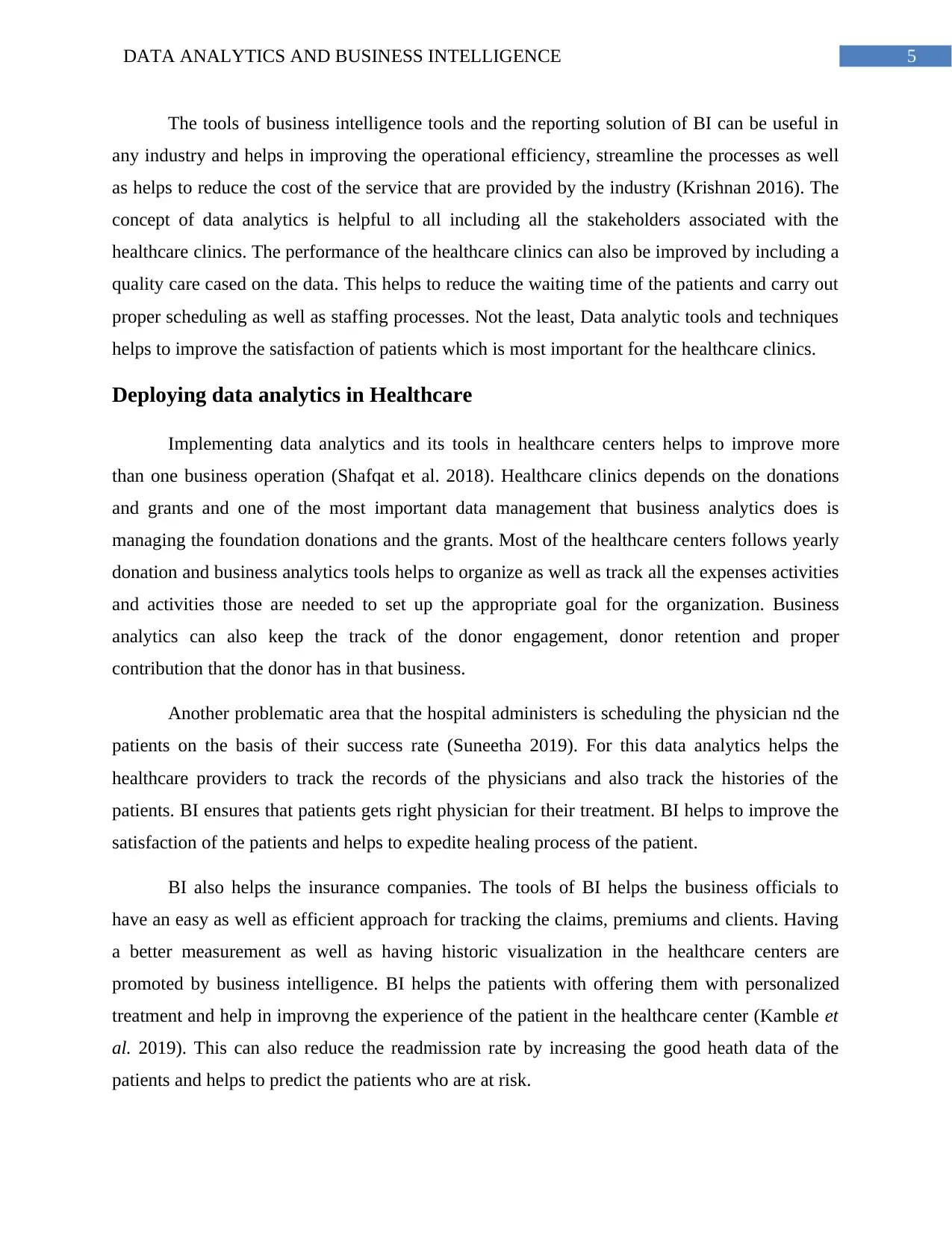
5DATA ANALYTICS AND BUSINESS INTELLIGENCE
The tools of business intelligence tools and the reporting solution of BI can be useful in
any industry and helps in improving the operational efficiency, streamline the processes as well
as helps to reduce the cost of the service that are provided by the industry (Krishnan 2016). The
concept of data analytics is helpful to all including all the stakeholders associated with the
healthcare clinics. The performance of the healthcare clinics can also be improved by including a
quality care cased on the data. This helps to reduce the waiting time of the patients and carry out
proper scheduling as well as staffing processes. Not the least, Data analytic tools and techniques
helps to improve the satisfaction of patients which is most important for the healthcare clinics.
Deploying data analytics in Healthcare
Implementing data analytics and its tools in healthcare centers helps to improve more
than one business operation (Shafqat et al. 2018). Healthcare clinics depends on the donations
and grants and one of the most important data management that business analytics does is
managing the foundation donations and the grants. Most of the healthcare centers follows yearly
donation and business analytics tools helps to organize as well as track all the expenses activities
and activities those are needed to set up the appropriate goal for the organization. Business
analytics can also keep the track of the donor engagement, donor retention and proper
contribution that the donor has in that business.
Another problematic area that the hospital administers is scheduling the physician nd the
patients on the basis of their success rate (Suneetha 2019). For this data analytics helps the
healthcare providers to track the records of the physicians and also track the histories of the
patients. BI ensures that patients gets right physician for their treatment. BI helps to improve the
satisfaction of the patients and helps to expedite healing process of the patient.
BI also helps the insurance companies. The tools of BI helps the business officials to
have an easy as well as efficient approach for tracking the claims, premiums and clients. Having
a better measurement as well as having historic visualization in the healthcare centers are
promoted by business intelligence. BI helps the patients with offering them with personalized
treatment and help in improvng the experience of the patient in the healthcare center (Kamble et
al. 2019). This can also reduce the readmission rate by increasing the good heath data of the
patients and helps to predict the patients who are at risk.
The tools of business intelligence tools and the reporting solution of BI can be useful in
any industry and helps in improving the operational efficiency, streamline the processes as well
as helps to reduce the cost of the service that are provided by the industry (Krishnan 2016). The
concept of data analytics is helpful to all including all the stakeholders associated with the
healthcare clinics. The performance of the healthcare clinics can also be improved by including a
quality care cased on the data. This helps to reduce the waiting time of the patients and carry out
proper scheduling as well as staffing processes. Not the least, Data analytic tools and techniques
helps to improve the satisfaction of patients which is most important for the healthcare clinics.
Deploying data analytics in Healthcare
Implementing data analytics and its tools in healthcare centers helps to improve more
than one business operation (Shafqat et al. 2018). Healthcare clinics depends on the donations
and grants and one of the most important data management that business analytics does is
managing the foundation donations and the grants. Most of the healthcare centers follows yearly
donation and business analytics tools helps to organize as well as track all the expenses activities
and activities those are needed to set up the appropriate goal for the organization. Business
analytics can also keep the track of the donor engagement, donor retention and proper
contribution that the donor has in that business.
Another problematic area that the hospital administers is scheduling the physician nd the
patients on the basis of their success rate (Suneetha 2019). For this data analytics helps the
healthcare providers to track the records of the physicians and also track the histories of the
patients. BI ensures that patients gets right physician for their treatment. BI helps to improve the
satisfaction of the patients and helps to expedite healing process of the patient.
BI also helps the insurance companies. The tools of BI helps the business officials to
have an easy as well as efficient approach for tracking the claims, premiums and clients. Having
a better measurement as well as having historic visualization in the healthcare centers are
promoted by business intelligence. BI helps the patients with offering them with personalized
treatment and help in improvng the experience of the patient in the healthcare center (Kamble et
al. 2019). This can also reduce the readmission rate by increasing the good heath data of the
patients and helps to predict the patients who are at risk.
⊘ This is a preview!⊘
Do you want full access?
Subscribe today to unlock all pages.

Trusted by 1+ million students worldwide
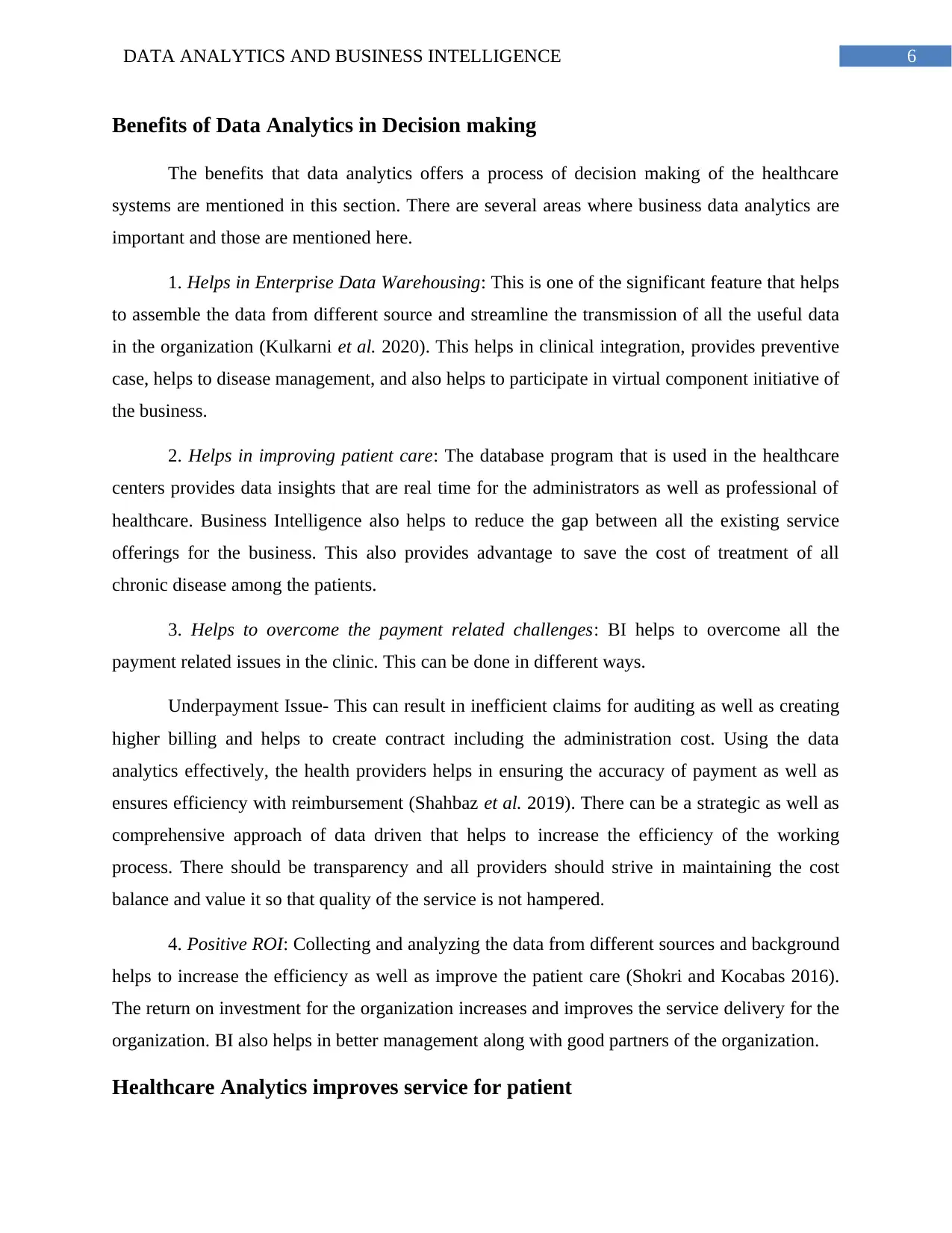
6DATA ANALYTICS AND BUSINESS INTELLIGENCE
Benefits of Data Analytics in Decision making
The benefits that data analytics offers a process of decision making of the healthcare
systems are mentioned in this section. There are several areas where business data analytics are
important and those are mentioned here.
1. Helps in Enterprise Data Warehousing: This is one of the significant feature that helps
to assemble the data from different source and streamline the transmission of all the useful data
in the organization (Kulkarni et al. 2020). This helps in clinical integration, provides preventive
case, helps to disease management, and also helps to participate in virtual component initiative of
the business.
2. Helps in improving patient care: The database program that is used in the healthcare
centers provides data insights that are real time for the administrators as well as professional of
healthcare. Business Intelligence also helps to reduce the gap between all the existing service
offerings for the business. This also provides advantage to save the cost of treatment of all
chronic disease among the patients.
3. Helps to overcome the payment related challenges: BI helps to overcome all the
payment related issues in the clinic. This can be done in different ways.
Underpayment Issue- This can result in inefficient claims for auditing as well as creating
higher billing and helps to create contract including the administration cost. Using the data
analytics effectively, the health providers helps in ensuring the accuracy of payment as well as
ensures efficiency with reimbursement (Shahbaz et al. 2019). There can be a strategic as well as
comprehensive approach of data driven that helps to increase the efficiency of the working
process. There should be transparency and all providers should strive in maintaining the cost
balance and value it so that quality of the service is not hampered.
4. Positive ROI: Collecting and analyzing the data from different sources and background
helps to increase the efficiency as well as improve the patient care (Shokri and Kocabas 2016).
The return on investment for the organization increases and improves the service delivery for the
organization. BI also helps in better management along with good partners of the organization.
Healthcare Analytics improves service for patient
Benefits of Data Analytics in Decision making
The benefits that data analytics offers a process of decision making of the healthcare
systems are mentioned in this section. There are several areas where business data analytics are
important and those are mentioned here.
1. Helps in Enterprise Data Warehousing: This is one of the significant feature that helps
to assemble the data from different source and streamline the transmission of all the useful data
in the organization (Kulkarni et al. 2020). This helps in clinical integration, provides preventive
case, helps to disease management, and also helps to participate in virtual component initiative of
the business.
2. Helps in improving patient care: The database program that is used in the healthcare
centers provides data insights that are real time for the administrators as well as professional of
healthcare. Business Intelligence also helps to reduce the gap between all the existing service
offerings for the business. This also provides advantage to save the cost of treatment of all
chronic disease among the patients.
3. Helps to overcome the payment related challenges: BI helps to overcome all the
payment related issues in the clinic. This can be done in different ways.
Underpayment Issue- This can result in inefficient claims for auditing as well as creating
higher billing and helps to create contract including the administration cost. Using the data
analytics effectively, the health providers helps in ensuring the accuracy of payment as well as
ensures efficiency with reimbursement (Shahbaz et al. 2019). There can be a strategic as well as
comprehensive approach of data driven that helps to increase the efficiency of the working
process. There should be transparency and all providers should strive in maintaining the cost
balance and value it so that quality of the service is not hampered.
4. Positive ROI: Collecting and analyzing the data from different sources and background
helps to increase the efficiency as well as improve the patient care (Shokri and Kocabas 2016).
The return on investment for the organization increases and improves the service delivery for the
organization. BI also helps in better management along with good partners of the organization.
Healthcare Analytics improves service for patient
Paraphrase This Document
Need a fresh take? Get an instant paraphrase of this document with our AI Paraphraser
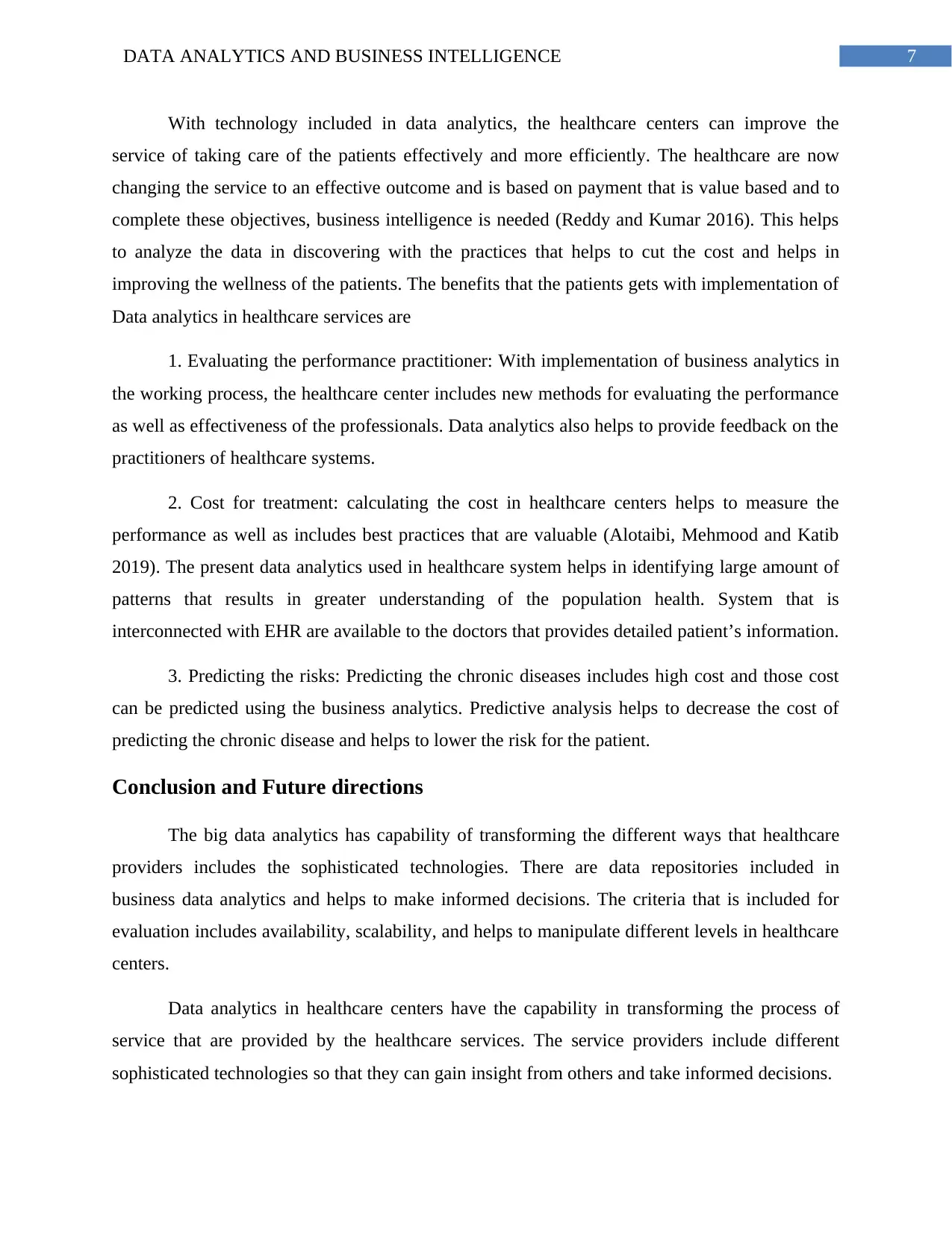
7DATA ANALYTICS AND BUSINESS INTELLIGENCE
With technology included in data analytics, the healthcare centers can improve the
service of taking care of the patients effectively and more efficiently. The healthcare are now
changing the service to an effective outcome and is based on payment that is value based and to
complete these objectives, business intelligence is needed (Reddy and Kumar 2016). This helps
to analyze the data in discovering with the practices that helps to cut the cost and helps in
improving the wellness of the patients. The benefits that the patients gets with implementation of
Data analytics in healthcare services are
1. Evaluating the performance practitioner: With implementation of business analytics in
the working process, the healthcare center includes new methods for evaluating the performance
as well as effectiveness of the professionals. Data analytics also helps to provide feedback on the
practitioners of healthcare systems.
2. Cost for treatment: calculating the cost in healthcare centers helps to measure the
performance as well as includes best practices that are valuable (Alotaibi, Mehmood and Katib
2019). The present data analytics used in healthcare system helps in identifying large amount of
patterns that results in greater understanding of the population health. System that is
interconnected with EHR are available to the doctors that provides detailed patient’s information.
3. Predicting the risks: Predicting the chronic diseases includes high cost and those cost
can be predicted using the business analytics. Predictive analysis helps to decrease the cost of
predicting the chronic disease and helps to lower the risk for the patient.
Conclusion and Future directions
The big data analytics has capability of transforming the different ways that healthcare
providers includes the sophisticated technologies. There are data repositories included in
business data analytics and helps to make informed decisions. The criteria that is included for
evaluation includes availability, scalability, and helps to manipulate different levels in healthcare
centers.
Data analytics in healthcare centers have the capability in transforming the process of
service that are provided by the healthcare services. The service providers include different
sophisticated technologies so that they can gain insight from others and take informed decisions.
With technology included in data analytics, the healthcare centers can improve the
service of taking care of the patients effectively and more efficiently. The healthcare are now
changing the service to an effective outcome and is based on payment that is value based and to
complete these objectives, business intelligence is needed (Reddy and Kumar 2016). This helps
to analyze the data in discovering with the practices that helps to cut the cost and helps in
improving the wellness of the patients. The benefits that the patients gets with implementation of
Data analytics in healthcare services are
1. Evaluating the performance practitioner: With implementation of business analytics in
the working process, the healthcare center includes new methods for evaluating the performance
as well as effectiveness of the professionals. Data analytics also helps to provide feedback on the
practitioners of healthcare systems.
2. Cost for treatment: calculating the cost in healthcare centers helps to measure the
performance as well as includes best practices that are valuable (Alotaibi, Mehmood and Katib
2019). The present data analytics used in healthcare system helps in identifying large amount of
patterns that results in greater understanding of the population health. System that is
interconnected with EHR are available to the doctors that provides detailed patient’s information.
3. Predicting the risks: Predicting the chronic diseases includes high cost and those cost
can be predicted using the business analytics. Predictive analysis helps to decrease the cost of
predicting the chronic disease and helps to lower the risk for the patient.
Conclusion and Future directions
The big data analytics has capability of transforming the different ways that healthcare
providers includes the sophisticated technologies. There are data repositories included in
business data analytics and helps to make informed decisions. The criteria that is included for
evaluation includes availability, scalability, and helps to manipulate different levels in healthcare
centers.
Data analytics in healthcare centers have the capability in transforming the process of
service that are provided by the healthcare services. The service providers include different
sophisticated technologies so that they can gain insight from others and take informed decisions.
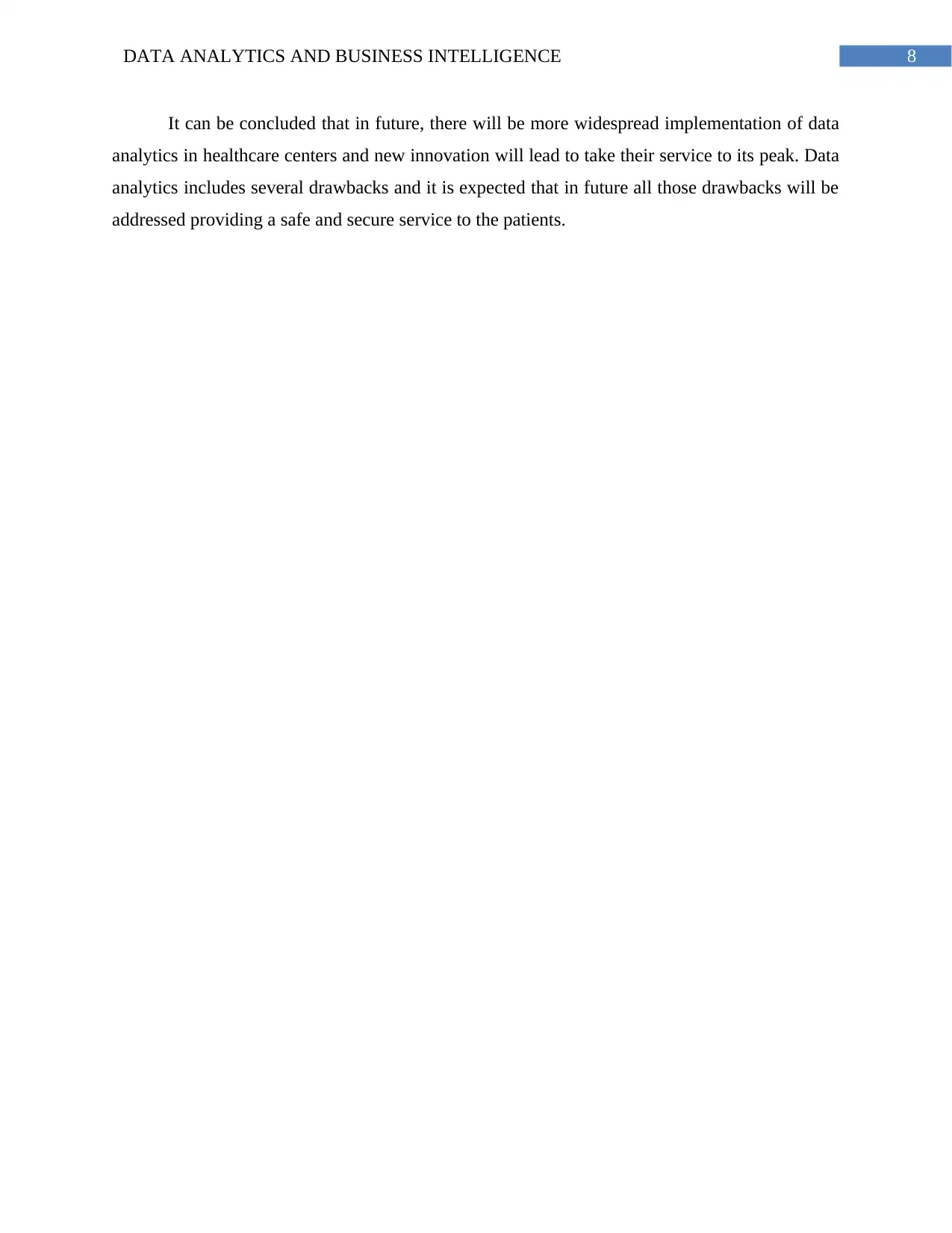
8DATA ANALYTICS AND BUSINESS INTELLIGENCE
It can be concluded that in future, there will be more widespread implementation of data
analytics in healthcare centers and new innovation will lead to take their service to its peak. Data
analytics includes several drawbacks and it is expected that in future all those drawbacks will be
addressed providing a safe and secure service to the patients.
It can be concluded that in future, there will be more widespread implementation of data
analytics in healthcare centers and new innovation will lead to take their service to its peak. Data
analytics includes several drawbacks and it is expected that in future all those drawbacks will be
addressed providing a safe and secure service to the patients.
⊘ This is a preview!⊘
Do you want full access?
Subscribe today to unlock all pages.

Trusted by 1+ million students worldwide
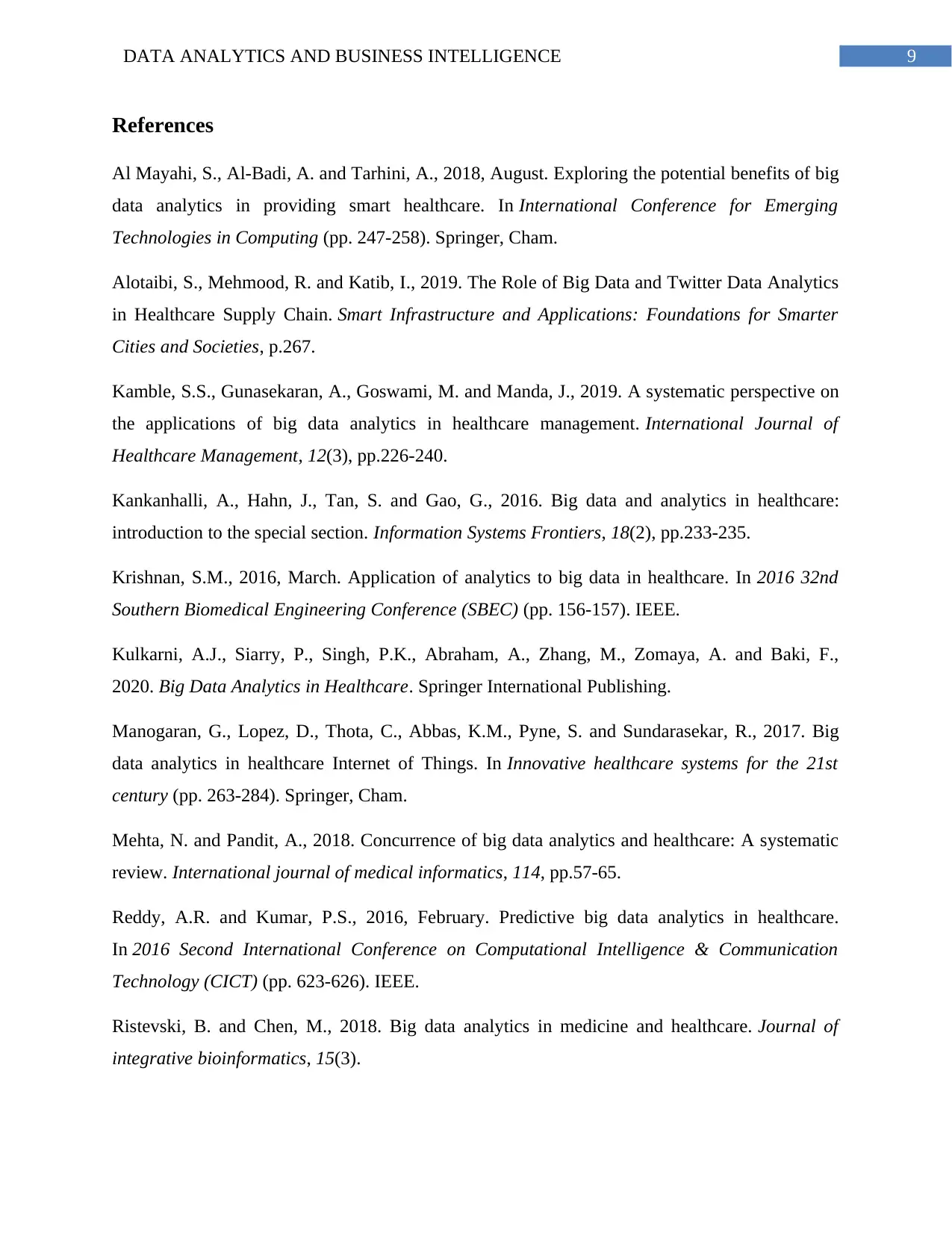
9DATA ANALYTICS AND BUSINESS INTELLIGENCE
References
Al Mayahi, S., Al-Badi, A. and Tarhini, A., 2018, August. Exploring the potential benefits of big
data analytics in providing smart healthcare. In International Conference for Emerging
Technologies in Computing (pp. 247-258). Springer, Cham.
Alotaibi, S., Mehmood, R. and Katib, I., 2019. The Role of Big Data and Twitter Data Analytics
in Healthcare Supply Chain. Smart Infrastructure and Applications: Foundations for Smarter
Cities and Societies, p.267.
Kamble, S.S., Gunasekaran, A., Goswami, M. and Manda, J., 2019. A systematic perspective on
the applications of big data analytics in healthcare management. International Journal of
Healthcare Management, 12(3), pp.226-240.
Kankanhalli, A., Hahn, J., Tan, S. and Gao, G., 2016. Big data and analytics in healthcare:
introduction to the special section. Information Systems Frontiers, 18(2), pp.233-235.
Krishnan, S.M., 2016, March. Application of analytics to big data in healthcare. In 2016 32nd
Southern Biomedical Engineering Conference (SBEC) (pp. 156-157). IEEE.
Kulkarni, A.J., Siarry, P., Singh, P.K., Abraham, A., Zhang, M., Zomaya, A. and Baki, F.,
2020. Big Data Analytics in Healthcare. Springer International Publishing.
Manogaran, G., Lopez, D., Thota, C., Abbas, K.M., Pyne, S. and Sundarasekar, R., 2017. Big
data analytics in healthcare Internet of Things. In Innovative healthcare systems for the 21st
century (pp. 263-284). Springer, Cham.
Mehta, N. and Pandit, A., 2018. Concurrence of big data analytics and healthcare: A systematic
review. International journal of medical informatics, 114, pp.57-65.
Reddy, A.R. and Kumar, P.S., 2016, February. Predictive big data analytics in healthcare.
In 2016 Second International Conference on Computational Intelligence & Communication
Technology (CICT) (pp. 623-626). IEEE.
Ristevski, B. and Chen, M., 2018. Big data analytics in medicine and healthcare. Journal of
integrative bioinformatics, 15(3).
References
Al Mayahi, S., Al-Badi, A. and Tarhini, A., 2018, August. Exploring the potential benefits of big
data analytics in providing smart healthcare. In International Conference for Emerging
Technologies in Computing (pp. 247-258). Springer, Cham.
Alotaibi, S., Mehmood, R. and Katib, I., 2019. The Role of Big Data and Twitter Data Analytics
in Healthcare Supply Chain. Smart Infrastructure and Applications: Foundations for Smarter
Cities and Societies, p.267.
Kamble, S.S., Gunasekaran, A., Goswami, M. and Manda, J., 2019. A systematic perspective on
the applications of big data analytics in healthcare management. International Journal of
Healthcare Management, 12(3), pp.226-240.
Kankanhalli, A., Hahn, J., Tan, S. and Gao, G., 2016. Big data and analytics in healthcare:
introduction to the special section. Information Systems Frontiers, 18(2), pp.233-235.
Krishnan, S.M., 2016, March. Application of analytics to big data in healthcare. In 2016 32nd
Southern Biomedical Engineering Conference (SBEC) (pp. 156-157). IEEE.
Kulkarni, A.J., Siarry, P., Singh, P.K., Abraham, A., Zhang, M., Zomaya, A. and Baki, F.,
2020. Big Data Analytics in Healthcare. Springer International Publishing.
Manogaran, G., Lopez, D., Thota, C., Abbas, K.M., Pyne, S. and Sundarasekar, R., 2017. Big
data analytics in healthcare Internet of Things. In Innovative healthcare systems for the 21st
century (pp. 263-284). Springer, Cham.
Mehta, N. and Pandit, A., 2018. Concurrence of big data analytics and healthcare: A systematic
review. International journal of medical informatics, 114, pp.57-65.
Reddy, A.R. and Kumar, P.S., 2016, February. Predictive big data analytics in healthcare.
In 2016 Second International Conference on Computational Intelligence & Communication
Technology (CICT) (pp. 623-626). IEEE.
Ristevski, B. and Chen, M., 2018. Big data analytics in medicine and healthcare. Journal of
integrative bioinformatics, 15(3).
Paraphrase This Document
Need a fresh take? Get an instant paraphrase of this document with our AI Paraphraser
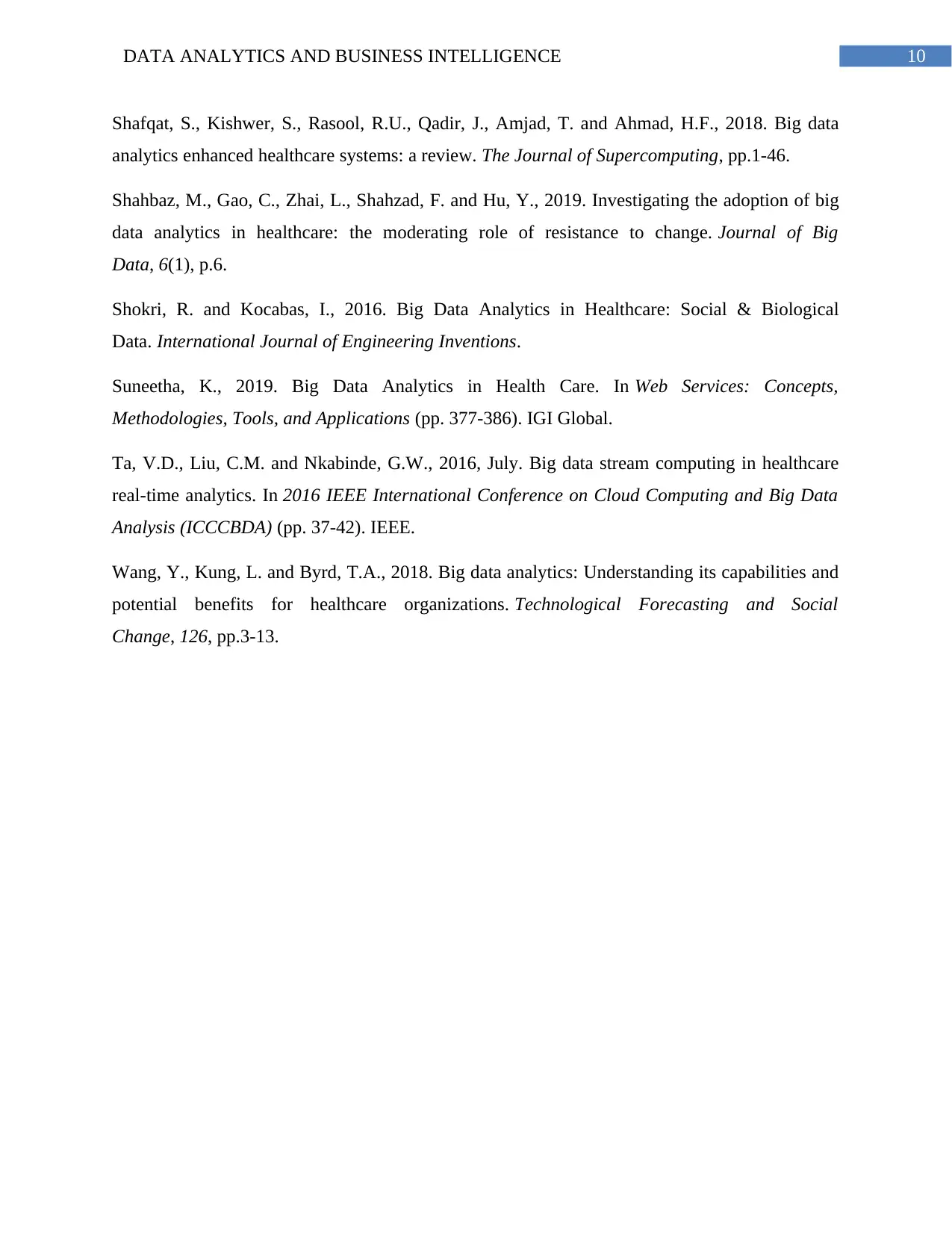
10DATA ANALYTICS AND BUSINESS INTELLIGENCE
Shafqat, S., Kishwer, S., Rasool, R.U., Qadir, J., Amjad, T. and Ahmad, H.F., 2018. Big data
analytics enhanced healthcare systems: a review. The Journal of Supercomputing, pp.1-46.
Shahbaz, M., Gao, C., Zhai, L., Shahzad, F. and Hu, Y., 2019. Investigating the adoption of big
data analytics in healthcare: the moderating role of resistance to change. Journal of Big
Data, 6(1), p.6.
Shokri, R. and Kocabas, I., 2016. Big Data Analytics in Healthcare: Social & Biological
Data. International Journal of Engineering Inventions.
Suneetha, K., 2019. Big Data Analytics in Health Care. In Web Services: Concepts,
Methodologies, Tools, and Applications (pp. 377-386). IGI Global.
Ta, V.D., Liu, C.M. and Nkabinde, G.W., 2016, July. Big data stream computing in healthcare
real-time analytics. In 2016 IEEE International Conference on Cloud Computing and Big Data
Analysis (ICCCBDA) (pp. 37-42). IEEE.
Wang, Y., Kung, L. and Byrd, T.A., 2018. Big data analytics: Understanding its capabilities and
potential benefits for healthcare organizations. Technological Forecasting and Social
Change, 126, pp.3-13.
Shafqat, S., Kishwer, S., Rasool, R.U., Qadir, J., Amjad, T. and Ahmad, H.F., 2018. Big data
analytics enhanced healthcare systems: a review. The Journal of Supercomputing, pp.1-46.
Shahbaz, M., Gao, C., Zhai, L., Shahzad, F. and Hu, Y., 2019. Investigating the adoption of big
data analytics in healthcare: the moderating role of resistance to change. Journal of Big
Data, 6(1), p.6.
Shokri, R. and Kocabas, I., 2016. Big Data Analytics in Healthcare: Social & Biological
Data. International Journal of Engineering Inventions.
Suneetha, K., 2019. Big Data Analytics in Health Care. In Web Services: Concepts,
Methodologies, Tools, and Applications (pp. 377-386). IGI Global.
Ta, V.D., Liu, C.M. and Nkabinde, G.W., 2016, July. Big data stream computing in healthcare
real-time analytics. In 2016 IEEE International Conference on Cloud Computing and Big Data
Analysis (ICCCBDA) (pp. 37-42). IEEE.
Wang, Y., Kung, L. and Byrd, T.A., 2018. Big data analytics: Understanding its capabilities and
potential benefits for healthcare organizations. Technological Forecasting and Social
Change, 126, pp.3-13.
1 out of 11
Related Documents
Your All-in-One AI-Powered Toolkit for Academic Success.
+13062052269
info@desklib.com
Available 24*7 on WhatsApp / Email
![[object Object]](/_next/static/media/star-bottom.7253800d.svg)
Unlock your academic potential
Copyright © 2020–2026 A2Z Services. All Rights Reserved. Developed and managed by ZUCOL.





